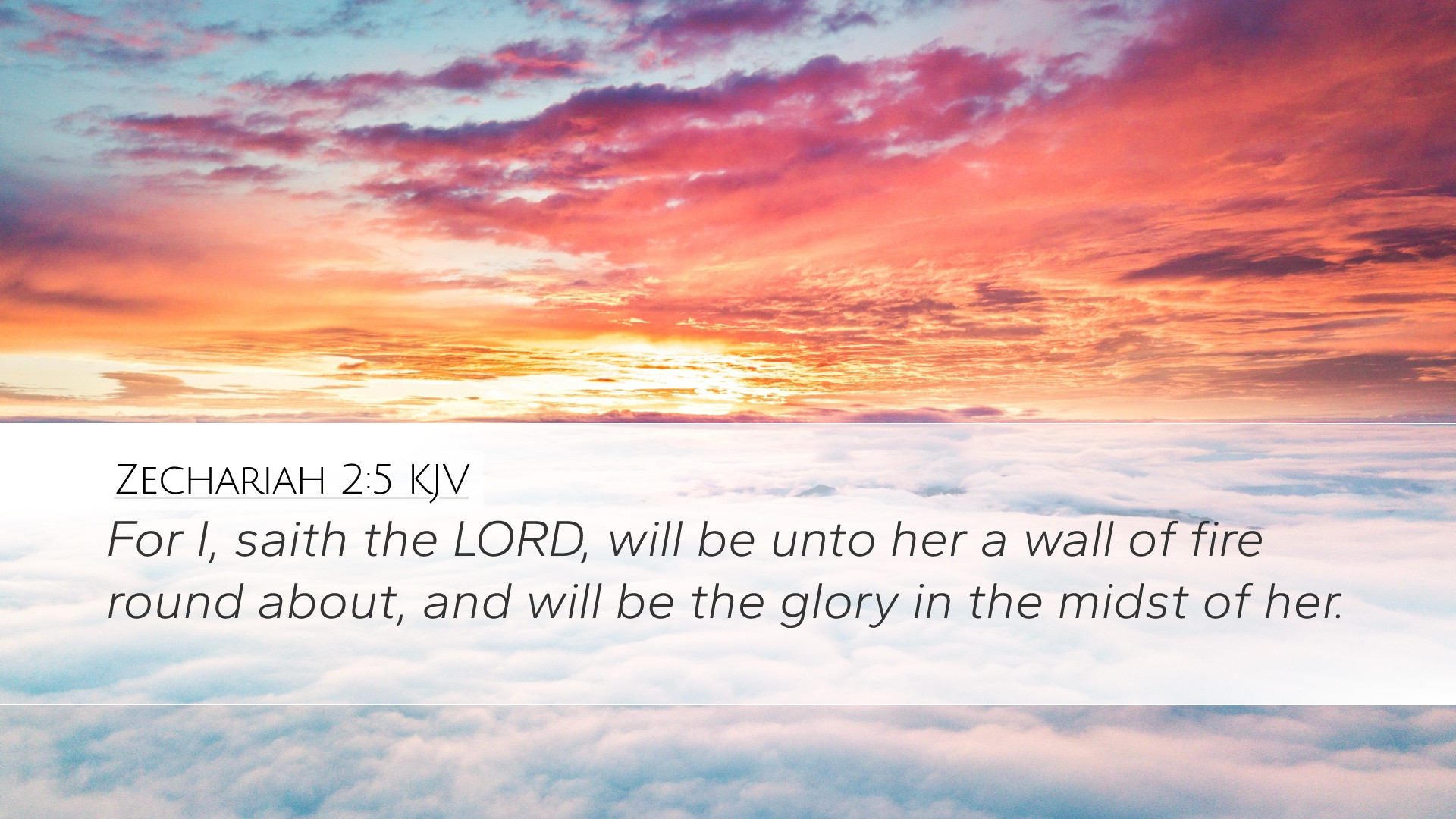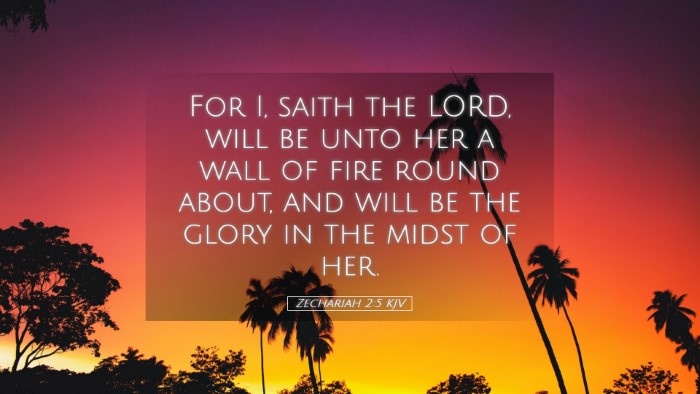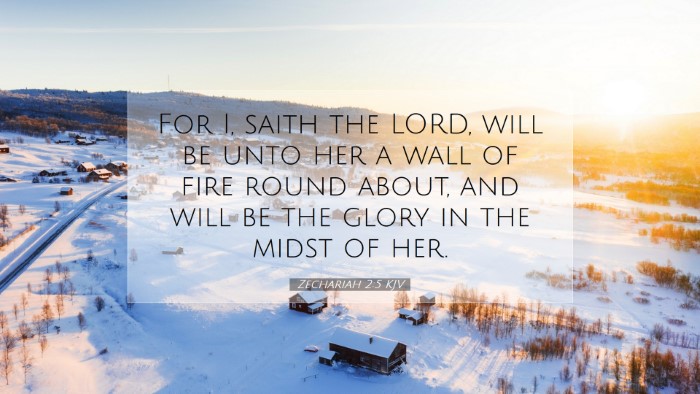Old Testament
Genesis Exodus Leviticus Numbers Deuteronomy Joshua Judges Ruth 1 Samuel 2 Samuel 1 Kings 2 Kings 1 Chronicles 2 Chronicles Ezra Nehemiah Esther Job Psalms Proverbs Ecclesiastes Song of Solomon Isaiah Jeremiah Lamentations Ezekiel Daniel Hosea Joel Amos Obadiah Jonah Micah Nahum Habakkuk Zephaniah Haggai Zechariah MalachiZechariah 2:5
Zechariah 2:5 KJV
For I, saith the LORD, will be unto her a wall of fire round about, and will be the glory in the midst of her.
Zechariah 2:5 Bible Commentary
Commentary on Zechariah 2:5
Zechariah 2:5 states, "For I, saith the Lord, will be unto her a wall of fire round about, and will be the glory in the midst of her." This verse encapsulates both a profound promise and a vivid metaphor, illustrating God's protective and glorious presence around His people, the inhabitants of Jerusalem. The richness of this verse can be appreciated more deeply through the insights of renowned biblical scholars.
Contextual Framework
Zechariah, a post-exilic prophet, speaks to the remnants of Israel who returned from Babylonian captivity. Amidst a period of rebuilding both the temple and their national identity, this verse shines as a beacon of hope and divine assurance. The imagery of "a wall of fire" suggests both protection and purity, while "the glory in the midst of her" communicates God’s indwelling presence.
The Divine Protection
According to Matthew Henry, the mention of "a wall of fire" conveys the idea of expansive protection. "God Himself is a wall of fire to His people; not only is He a refuge, but a consuming fire to their enemies." This highlights a dual aspect of God's protective nature—He surrounds His people to safeguard them from dangers while simultaneously avenging any offenses against them.
Adam Clarke emphasizes the strength and invulnerability that such a wall implies. He writes, "A wall of fire, which could not be penetrated, signifies an impregnable defense from all enemies, both physical and spiritual." Clarke suggests that in a world fraught with trials and adversities, this assurance of divine protection serves as a comforting reminder that God is actively involved in the lives of His faithful.
The Glory in the Midst
In the second part of the verse, "I will be the glory in the midst of her," we discover God's affirmation of His presence amongst His people. Albert Barnes interprets this as the promise of God's abiding glory, stating, "The glory here is the Shekinah, the visible manifestation of God's presence, which assures His people of His nearness and favor." This divine glory signifies not only presence but also a transformation of the community's identity as they dwell under God’s favor.
Theological Implications
The implications of this verse extend into the spiritual lives of believers today. The metaphor of protection and glory can be applied in understanding God's role in the midst of contemporary believers. Matthew Henry elucidates this by asserting, "In times of chaos and distress, God’s people must draw near, for He is as a wall of fire around them, nurturing their faith and fortifying their mental and spiritual resolve."
This reminder echoes in the life of the Church, which is constantly surrounded by cultural and moral challenges. Adam Clarke states, "The promise that God Himself will dwell among His people lays the foundation for the Church's glory and strength, invoking the Spirit's presence in every assembly and gathering." This speaks to the nature of worship and community in the light of divine presence.
Application for Pastors and Theologians
Pastors, when preaching from Zechariah 2:5, should consider the implications of God's protective presence in their sermons. They can encourage congregations to seek reassurance in their vulnerabilities, reaffirming that God not only surrounds them but also dwells within them. Drawing from these commentaries, they can illustrate how the wall of fire symbolizes God’s consuming interest in their affairs.
Theologians can analyze this verse within the broader context of God’s covenant relationship with His people, noting how the promise in Zechariah draws parallels to themes of promise and presence found throughout Scripture. As Albert Barnes remarks, "Every believer can claim this promise as part of their inheritance, for in Christ, they become the temple where the glory of the Lord dwells."
Conclusion
Zechariah 2:5 is a multifaceted verse rich with implications for understanding God's character and relationship with His people. It promises protection as well as assurance of divine presence—a duality that speaks profoundly to the struggles and aspirations of believers. Taking insights from Matthew Henry, Albert Barnes, and Adam Clarke, the Church is reminded that in every situation, God remains a wall of fire and a glorious presence, ever faithful to those who seek Him.


